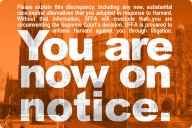You have /5 articles left.
Sign up for a free account or log in.
I have been wanting to write about this for a long time but have not known if it was a safe topic in academia.
I have a learning disability and it is something that is generally (almost never) spoken about. I have chosen to keep it a secret because I have had bad experiences growing up sharing this part of myself. A couple years ago, I thought I was ready to share this information and had even considered focusing my dissertation on students with learning disabilities in academia, but ended up not feeling ready.
Today, it is taken for granted that I can have a learning disability and be a good student. Yet life has not always been smooth sailing, such as in high school when my AP English teacher yelled at me in public about how learning disabilities do not exist, and how I was “making it all up!” People did not understand how I could be a “straight A” student and have a learning disability. It just did not make sense to them. Aside from teachers not understanding, even my best friend did not get it, and eventually our friendship ended.
Fortunately two decades have now passed and some things have changed. I am now ready to share my story.
After high school, I moved a thousand miles away to go to college, and found an incredibly welcoming academic environment. No more teachers who yelled at me for telling them about my learning disability. Instead, most professors were incredibly thoughtful and happy to accommodate me. (As a side note, although it is the law to accommodate students with documented learning disabilities, it does not have to be done happily.) On campus, there was a center for learning disability services staffed with graduate students trained to work with each registered student. Each undergraduate was assigned a graduate student who was our personal support system and advisor. The graduate students received credit for working with us, as well as hands on practice, and we met regularly throughout the semester to see if there was anything they could do for us. I felt good. I felt like I was a responsible student (which I was), who was capable of doing my work (which I could).
In a nutshell, I was treated with respect. In general being treated with respect is a non-experience. Respectful behavior often goes unnoticed; it is the essence of unremarkable, until it disappears. At least for me, that is what happened.
Fast forward to today. The university I attend as a doctoral student has a disability services center, however it varies drastically from the one I experienced in my undergraduate days. My experiences have included ones that were okay, such as being listened to when I called or came into the office. However, my experiences have also included being ignored, talked down to, and having my water bottle removed during a testing session because “you might spill it on your test paper and you are allowed only one paper” (this was told to me in a slow, measured voice which in the best scenario was condescending).
Being treated in this – disrespectful – manner, has left me uninterested in dealing with the disability office and reminded me of my negative experiences sharing with others that I have a learning disability. The fears of being yelled at, ignored, or treated like a child feel exceptionally fresh in my mind.
Yet I know today that this topic of learning disabilities and academia is significant. I believe that it is important to write these words and have others read them. I once saw a documentary that included people who had become famous talking about their learning disabilities and struggles growing up. Their willingness to share and make themselves vulnerable was important for me to see, and I hope this piece will help someone else in a similar way. In talking about my own struggles to gain and maintain respect as a doctoral student with a learning disability, I hope to provide voice for an unvoiced student and perhaps help university policy evolve to a constant level of respect when addressing everyone, including those with learning disabilities.
Although I have had some difficulties with disability services at my university, it should be noted that overall the office has an excellent mission and all of my professors have been exceptional in their support of me and my learning disability.
Anna CohenMiller is a doctoral student in the department of Interdisciplinary Learning and Teaching studying adult education at the University of Texas at San Antonio. She has a background in anthropology, education, and Spanish and is focusing her dissertation on the institutional obstacles to motherhood in academia for graduate students and junior faculty. Anna is an avid artist and examples of her photography can be found at http://Anna.CohenMiller.com. You can follow her on Twitter @annaramona or contact her via email at Anna@CohenMiller.com








